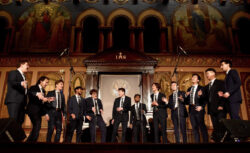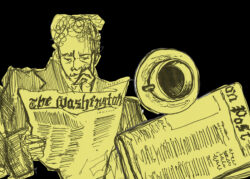Sabrina Karim (SFS ‘07) believes that education can get you where you want to go. The daughter of two teachers, she tutors with Georgetown’s D.C. Schools Program.
“The thing about educational outreach is that you’re really making a difference in one person’s life,” Karim said. “You see the improvement; you go through their trials and tribulations. Teaching is a really personal thing.”
Over 500 Georgetown students who choose to teach with one of Georgetown’s many educational outreach programs each year agree with her. However, Georgetown has never had an education department to service students passionate about education.
This is all about to change with the proposal of the Program in Teaching and Learning and its affiliated minor. Though the proposal does not include either an education major or department, students passionate about teaching and learning may soon be able to hone their teaching skills within an organized minor if the program is instituted.
The committee of students, teachers and administrators that conceived the proposal for the Program in Teaching and Learning has a new and different way of looking at teaching education. Rather than focus on pure pedagogy, the program has the potential to fuse students with diverse interests and goals around a common ethos: the importance of education for its own sake. This innovation will shape the future careers of Georgetown students interested in education.
Long awaited, finally here?
As a Jesuit research institution, Georgetown faces a bit of an identity crisis in regards to education. On the one hand, the University’s emphasis on service, social justice and the importance of teaching and learning points logically at education as an academic discipline. On the other hand, the study of education as its own discipline can carry a stigma. As a research institution, Georgetown may be an unfriendly atmosphere for educational instruction.
“In many institutions except for a school of education, teaching and focusing on k-12 education is not considered a positive step towards tenure and promotion.” Tom Bullock, an Assistant to the President in the Office for DC Education Initiatives said. “For tenure and promotion we want to know what have you published, what research have you done, how have you advanced your discipline.”
The University has in recent years slowly started building an education infrastructure. The year 2000 saw the formation of the Center for New Designs in Learning and Scholarship, which focuses on teaching and learning issues on campus. In 2001, the University founded the Center for Social Justice and with it the Office of Curriculum and Pedagogy. Offices like the OCP and CNDLS provide a community, supported by the University, around educational outreach. With the institution of the Program in Teaching and Learning, this community will be opened to students in a new and exciting way.
“This is certainly not the first effort at Georgetown to formalize integration of educational issues into the curriculum in a systematic fashion,” Heidi Elmendorf, an Assistant Professor in the Biology Department and the co-author of the proposal for the Program in Teaching and Learning, said. “So why is the timing right for a renewed effort? Largely because there is a confluence of interest and initiatives emerging from student, faculty and administrative circles.”
Student demand is evident in both participation in educational outreach-of the 1,400 students who volunteer weekly, 500 choose educational outreach-and the popularity of classes that focus on education. Faculty support already clearly exists; departments from Philosophy to Biology offer teaching-oriented classes. Administrative support is exemplified by the multiple offices on campus that focus on both off-campus educational outreach and educational development within the Georgetown community. All three circles of support are critical for the program’s success.
Commitment and community
Between volunteering with D.C. Schools and in the Sursum Corda housing project community, Emily Conger (CAS ‘05) has accumulated extensive experience with teaching in her fsour years here. When she organized and ran a summer camp for underprivileged area youth last summer, she met the nine-year-old girl she currently tutors. Conger has worked with her through her switch from public to charter schools and is energized by her progress.
“I’m really trying to ingrain the idea that she’ll go to college,” Conger said. “I keep saying things like ‘when you’re at Georgetown’ and introducing her to professors.”
Next year, Conger will relocate to Southern Louisiana as a member of Teach for America. Like many of her fellow soon-to-be alumni, Conger will commit her two post-graduate years to a struggling elementary school. In the class of 2004, 89 Georgetown graduates applied for Teach for America, placing Georgetown as the leading source of applicants in the region.
Though some students may volunteer for educational outreach to pad their resumes, a great many are seriously interested and committed. Those students deserve a community in which they may pursue such interests with the goal of applying for such a program as TFA.
Chris Kelly can attest to the importance of community among young teachers. When he quit a lucrative job in telecommunications to teach in an inner-city elementary school, he was living in a house with friends whose professions had nothing to do with education.
“Shared experience can help you understand better, reaffirm the value of it, help you not get as frustrated as you might get if you were out there on your own,” he said.
Kelly taught for six years at Assumption School in Anacostia, southeast D.C.’s poor and predominantly African-American neighborhood and has now been the school’s principal for 10. Last year, the Archdiocese of Washington named him the principal of the year for his work.
Assumption School plays host each year to Georgetown students who study education through the Catholic Schools Project, headed by Professor John Hirsh in the English department, which is celebrating its 10th anniversary this year. Founded by Dr. Hirsh and Daniel Curtin, now the executive director of the National Catholic Educational Association, the project offers students the opportunity to combine curricular study of pedagogical theories and current issues in education with work in one of three inner-city Catholic schools.
The CSP and its counterparts in other disciplines, which exist in both the English and Biology departments, join disciplinary study with hands-on participation in D.C. schools. Students contribute to the communities in which they are immersed while gaining the shared learning experience crucial to their study of education. The proposed program and its minor will extend that community even further.
The Minor in Teaching and Learning
The program itself and its minor will be as diverse as the students, faculty and administrators who helped to draft it. As proposed, the minor has four components: A foundation and a capstone course will unite the members of the program. Pedagogy courses offered in one of four departments aim to teach students how the knowledge they gain in their majors will translate to teaching. The third course component will emphasize larger themes in education, such as policy, social justice and leadership. Lastly, students will participate in a practicum, which will give them hands-on teaching experience.
Already submitted, the program will go before the College Curriculum Committee in the coming weeks for approval and could become a reality for 25 admitted students as early as next year. Elmendorf and the proposal’s co-author, English Professor Randy Bass, expect that the program will grow over time.
“We think it likely that students will choose to take such classes and/or enroll in the minor for diverse reasons,” Elmendorf said. “An interest in post baccalaureate employment in teaching, plans for graduate school with an interest in teaching as well as research, an interest in the social contexts of education, and an interest in new ways to connect with academic disciplines.”
The vast majority of courses included in the minor already exist; the program will simply combine them into one cohesive, accredited experience. According to Elmendorf, the emphasis is on providing students with experiences that will highlight both the theory and practice of pedagogy.
An innovative approach
Even without a disciplinary department of education on campus, a community has sprung up around educational outreach. As a Jesuit institution, Georgetown attracts students with a strong commitment to social justice. Filling a void in Georgetown’s curricular offerings, the proposed program can only improve the bond between the University’s dual identity as a Jesuit institution and a world-class university by graduating future teachers and legislators who embody Georgetown’s guiding philosophy.
The program’s proposal not only recognizes a need on Georgetown’s campus, but also a need in the teaching of education as a discipline. As a minor, it allows students to increase the depth of their knowledge in the subject in which they will major while adding to the breadth of that knowledge by minoring in Teaching and Learning.
In its proposed format, the minor recognizes what current research in pedagogy suggests: The necessity for teachers to, along with learning how to teach, learn what they will teach. A broad base of knowledge is essential for any teacher, and this is recognized in the program’s design.
“The unique thing that research is saying is that we [the United States] train teachers to be experts in teaching,” Bullock said. “The science of teaching and pedagogy. We do that very well. But we don’t train teachers too well in what they’re teaching: content.”
Big GOLEs
Existing outreach groups already work toward bettering the education system in D.C.. With the addition of the Program in Teaching and Learning, those programs will find curricular support that will grant them even greater depth.
“It’s definitely a positive step,” Albert Wat, director of D.C. Schools, said. “There’s a lot of potential for students to participate in service programs but at the same time enrich it with academic work.” Students involved in the program, he believes, will bring back the insights that they may learn in classes and expose other tutors to the concepts that they learn.
The students who created the Georgetown Outreach for Learning and Education certainly believe this to be the case. Karim founded GOLE with Stephen Silvius (CAS ‘07) last fall under the assumption that without a department of education at Georgetown, there isn’t one umbrella source of support for educational outreach on campus. GOLE is meant to be this source. By working with the Program in Teaching and Learning to help focus existing support for educational outreach on campus, it hopes to streamline efforts exerted by individual groups.
GOLE will host representatives from campus educational outreach groups on April 21, Education Awareness Day. Students will be able to peruse the extensive opportunities for educational outreach available to them. Aspirations for next fall’s fair include other D.C. universities; Karim, Silvius and Bullock hope to join area schools to work towards blanketing D.C. schools with educational support. Nevertheless, Thursday’s guiding goal is a bit simpler.
“We want the curriculum committee there,” Silvius said. “We want them to see how much support there is. They know students are teaching, but they don’t know how far students want to go, and I think the answer is pretty far.”






